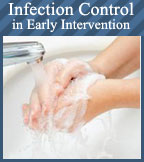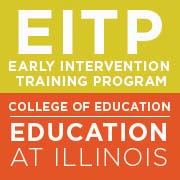Infection Control - Universal Precautions & Bloodborne Pathogens online Course & Certification Outcomes
Please scroll down for outcomes per discipline and other information, such as Target Audience, Course Content and Level
Course intent: Provide physical & occupational therapists as well as speech language pathologists and other early intervention providers with the clinical background to understand the clinically and professionally relevant issues regarding infection control.
Relevance to speech language pathology, physical & occupational therapy as well as other disciplines: Children in the early intervention setting may be immuno-compromised by virtue of having immature immune systems or illnesses. Occupational Therapists in the early intervention setting are on the front line of interacting with children who may be at risk for infection transmission. By taking appropriate precautions (Universal Precautions), providers can help prevent the spread of disease and protect themselves when necessary.
Outcomes:
- Provider will be able to: Describe their State obligatory & imperative responsibilities, based upon State early intervention regulations – Health and Safety Standards, that all early intervention providers be actively involved in a preventative manner, and be ready to participate in practicing universal precautions, when appropriate with respect to the child’s health and safety.
- Provider will be able to: Describe universal precautions, the cleaning and disinfection of soiled surfaces, handling of bodily fluids, and adequate disposal of waste.
- Provider will be able to: Describe the theory of infectious disease, pathogens, disease vectors, and pathogen transmission.
- Provider will be able to: Identify types of immunity, antibody-antigen relationship, and how to minimize exposure through appropriate hand-washing and drying techniques.
- Provider will be able to: Identify which vaccinations are appropriate for all providers entering homes; and which disease processes warrant interruption or cessation of early intervention services.
- Provider will be able to: Describe how to handle exposure to blood and other infectious agents and how to disinfect hands, lungs, and therapists toys against bodily fluids; and other potential sources of infection.
Speech Language Pathology:
Target Audience: Speech Language Pathologists, Speech teachers and Audiologists, Occupational therapists, COTA, SI/SE, SW, PT, PTA
Course Level: Various Content: Related
subject Code: 7060 Patient/Client Safety and Prevention of Medical Errors
AOTA Classification Codes:
Category 3: Professional Issues
Legal, Legislative, Regulatory & Reimbursement Issues
Federal & State regulatory Statutes [as related to legal obligation & Good Samaritan laws]
Licensure & Practice Issues [as related to legal obligation & Good Samaritan Laws] Contemporary Issues and Trends; Ethics; Professional Development and Continuing Competence
Target level: all levels, all practice areas/ specialties
Prerequisites: None
Course Agenda:
- Introduction
- History of Infectious Disease
- Pathogens
- Viruses
- Virus vs Bacteria
- Destroying Harmful Microbes
- How pathogens are transmitted
- Blood borne and airborne pathogens
- The Immune system and types of immunity
- Tonsils and adnoids
- Thymus
- Skin
- Lymph system
- White blood cells
- Antibodies and antigens
- Hand washing and drying
- Vaccination
- Personal protective equipment
- Disposable gloves
- Needles and Sharps
- Universal Precautions
- Handling blood and other possible infectious material
- EI and pre school applications
- Toys and Infection Control








